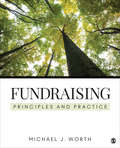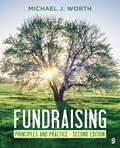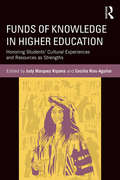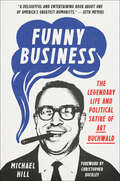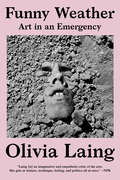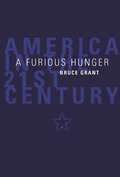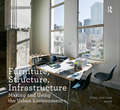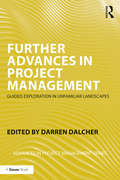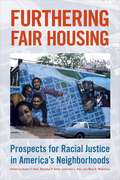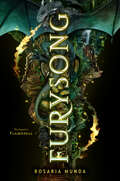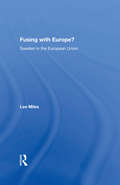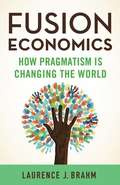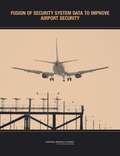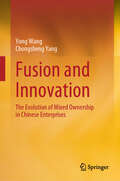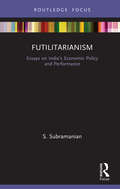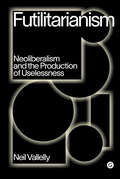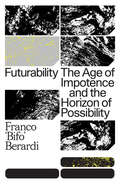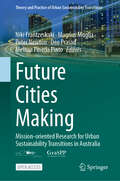- Table View
- List View
Fundraising: Principles and Practice
by Michael J. WorthFundraising: Principles and Practice provides readers with a comprehensive introduction to fundraising. Taking a balanced perspective, bestselling author Michael J. Worth offers insights on the practical application of relevant theory. The text is designed to engage readers in thinking critically about issues in fundraising and philanthropy to prepare them for careers in the nonprofit sector. Worth explores donor motivations and fundraising techniques for annual giving programs, major gift programs, planned giving, and corporate and foundation giving and campaigns. Traditional methods, including direct mail and personal solicitations, are discussed as well as new tools and practices, including online fundraising, crowd-funding and social networks, analytics, and predictive modeling. Written specifically for nonprofit career-oriented individuals, this book helps readers become successful fundraisers.
Fundraising: Principles and Practice
by Michael J. WorthThe Second Edition of Fundraising: Principles and Practice by best-selling author Michael Worth offers an updated comprehensive introduction to fundraising that focuses on both theory and practice. The text is designed to engage students in thinking critically about issues in fundraising and philanthropy to prepare them for careers in the nonprofit sector. Worth explores key topics like donors, annual giving programs, major gift programs, and corporate and foundation giving and campaigns. A chapter on international and global fundraising and philanthropy covers key considerations, obstacles, and strategies for managing international NGOs and global organizations, and coverage of planned giving and digital fundraising reflect important current trends.
Fundraising: Principles and Practice
by Michael J. WorthThe Second Edition of Fundraising: Principles and Practice by best-selling author Michael Worth offers an updated comprehensive introduction to fundraising that focuses on both theory and practice. The text is designed to engage students in thinking critically about issues in fundraising and philanthropy to prepare them for careers in the nonprofit sector. Worth explores key topics like donors, annual giving programs, major gift programs, and corporate and foundation giving and campaigns. A chapter on international and global fundraising and philanthropy covers key considerations, obstacles, and strategies for managing international NGOs and global organizations, and coverage of planned giving and digital fundraising reflect important current trends.
Funds of Knowledge in Higher Education: Honoring Students’ Cultural Experiences and Resources as Strengths
by Judy Marquez Kiyama Cecilia Rios-AguilarRefining and building on the concept in a sophisticated and multidisciplinary way, this book uses a funds of knowledge approach and connects it to other key conceptual frameworks in education to examine issues related to the access and transition to college, college persistence and success, and pedagogies in higher education. Research on funds of knowledge has become a standard reference to signal a sociocultural orientation in education that seeks to build strategically on the experiences, resources, and knowledge of families and children, especially those from low-income communities of color. Challenging existing deficit thinking in the field, the contribution of this unique and timely book is to apply this concept to and map future work on funds of knowledge in higher education.
Funny Business: The Legendary Life and Political Satire of Art Buchwald
by Michael Hill&“A delightful and entertaining book about one of America&’s greatest humorists.&”—Seth Meyers This &“absorbing, illuminating&” (Jon Meacham) biography of the legendary political humorist reveals the life behind his must-read Washington Post columns, featuring never-before-published photos, documents, and interviews.Before Jon Stewart, Stephen Colbert, Trevor Noah, and Doonesbury, there was Art Buchwald. For more than fifty years, from 1949 to 2006, Art Buchwald&’s Pulitzer Prize–winning column of political satire and biting wit made him one of the most widely read American humorists and a popular player in the Washington world of Ethel and Ted Kennedy, Ben Bradlee, and Katharine Graham. Dean Acheson, former U.S. Secretary of State, called Buchwald the &“greatest satirist in the English language since Pope and Swift.&”Drawing on Buchwald&’s most memorable columns and unpublished correspondence with other famous people, Funny Business shows how Art Buchwald became an American original. Like Mark Twain, Dorothy Parker, and James Thurber, he satirized political scoundrels, lampooned the powerful, and &“worshipped the quicksand&” that ten presidents walked on, as Buchwald joked. &“The key to Buchwald&’s style of humor, he once stated, was to &“treat light subjects seriously and serious subjects lightly.&”But there was a darker, more serious side to Art Buchwald. A childhood spent in foster homes taught him to see comedy as a refuge. Buchwald also struggled with depression, a secret he kept from the public for nearly thirty years.This revealing book is studded with stories of Buchwald&’s friendships with Humphrey Bogart, John Steinbeck, Irwin Shaw, William Styron, Erma Bombeck, Frank Sinatra, Adam West ("Batman"), Robert Frost, and others. Throughout his career, Buchwald wrote about such historical events as the Vietnam War, the assassinations of John and Robert Kennedy, Watergate, and the 9/11 terrorist attack. Featured here are stories of Buchwald&’s nonstop one-liners, known in his day as &“Buchshots.&”Entertaining and absorbing, Funny Business looks back on Buchwald&’s brilliant gift for humor and satire, which will once again bring readers a comedic respite from troublesome times.
Funny Kid for President
by Matt StantonBig Nate meets Timmy Failure in Funny Kid for President, the first book in an uproarious new middle grade series by Matt Stanton, Australia’s bestselling children’s book author. When Max gets blamed for pooping in the storeroom (which he did NOT do), tensions hit an all-time high between him and his terrifyingly large teacher, Mr. Armstrong. But then, the most unexpected thing happens—the school principal, Mrs. Sniggles, suggests Max run for class president.Max isn’t the only kid on the ballot, however. His archenemy, Abby Purcell, is also up for election—and she’s out to defeat him at all costs. To win, Max is going to need the 24/7 help of his best friend, Hugo, and he’s going to have to run the campaign of a lifetime.Max may not be the smartest or fastest kid, or the handsomest, but he just might be the funniest kid you’ll ever meet—and it’s this talent that could turn him from underdog to top dog. Max for President! Matt Stanton brings his veteran children’s book chops to this hilarious new series, perfect for early middle grade readers looking for side-splitting laughs!
Funny Weather: Art In An Emergency
by Olivia Laing“One of the finest writers of the new non-fiction” (Harper’s Bazaar) explores the role of art in the tumultuous twenty-first century. In the age of Trump and Brexit, every crisis is instantly overridden by the next. The turbulent political weather of the twenty- first century generates anxiety and makes it difficult to know how to react. Olivia Laing makes a brilliant, inspiring case for why art matters more than ever, as a force of both resistance and repair. Art, she argues, changes how we see the world. It gives us X-ray vision. It reveals inequalities and offers fertile new ways of living. Funny Weather brings together a career’s worth of Laing’s writing about art and culture, and their role in our political and emotional lives. She profiles Jean-Michel Basquiat and Georgia O’Keeffe, interviews Hilary Mantel and Ali Smith, writes love letters to David Bowie and Wolfgang Tillmans, and explores loneliness and technology, women and alcohol, sex and the body. With characteristic originality and compassion, Funny Weather celebrates art as an antidote to a terrifying political moment.
Furious Hunger
by Bruce GrantAt the end of the twentieth century, the United States—the most powerful nation on earth—is driven by quasi-religious patriotism and by conspicuous materialism. At once restless and violent, creative and democratic, it is also, at another level, deeply unsure of itself. Bruce Grant's engrossing text reveals the core of America's greatness—and its vulnerability. Americans believe that their country is blessed and exceptional—blessed by God and nature, exceptional because of their management of the twin icons, democracy and capitalism. But have Americans separated themselves too much from the rest of the world? Can they meet the challenge of the 21st century, which is to provide true global leadership? A Furious Hunger is a penetrating exploration of America's way of life, its people, its history, its rhetoric, its government and politics, and its arts and popular culture. The author's 'modest intention' is to try to understand the United States better, not as the leader of the Western world, but as itself. Bruce Grant writes critically and sympathetically of the country and the people he has visited and observed for over thirty years. This original and challenging book will interest readers who welcome America's influence on our lives as well as those who resist it. All we know is that having everything we yet hold nothing, that feeling the wild song of this great earth upwelling in us we have no word to give it utterance. All we know is that here the passionate enigma of our lives is so bitterly expressed, the furious hunger that so haunts and hurts Americans so desperately felt—that being rich, we are all yet poor, and having an incalculable wealth we have found no way of spending it, that feeling illimitable power we have yet found no way of using it.—Thomas Wolfe
Furnishing Fascism: Modernist Design and Politics in Italy
by Ignacio G. GalánThe role of modernist interior design in the construction of Italian nationalism Along with the rise of Mussolini&’s fascist regime, the interwar years in Italy also saw the widespread development of its modernist interior design and furnishing practices. While the regime&’s politics were overtly manifest in monumental government architecture, Furnishing Fascism examines the subtler yet effective role of household goods and decor in the cultivation of Italy&’s exclusionary sense of national identity. Presenting a fresh look at the work of various architects and designers, including iconic figures such as Gio Ponti and Carlo Enrico Rava, Ignacio G. Galán explores how seemingly neutral products of everyday life contributed to the propagation of fascist ideology. Through extensive promotion in popular magazines and department stores, on the film sets of Cinecittà Studios, and throughout the country&’s colonial territories, Italy&’s modernist design practices were part of a larger political project that aimed to produce a totalizing image of cultural hegemony. Interweaving design theory, architectural history, and media scholarship, Furnishing Fascism reexamines the period&’s so-called minor arts to reveal the political entanglement of modernism in early twentieth-century Italy and offers valuable insight into the complications of cultural production under the auspices of authoritarian power. Retail e-book files for this title are screen-reader friendly with images accompanied by short alt text and/or extended descriptions.
Furniture, Structure, Infrastructure: Making and Using the Urban Environment (Design Research in Architecture)
by Nigel BertramObservation and analysis are types of invention. They make things apparent which perhaps were invisible. By noticing, drawing and naming something we bring it into being. On the other hand, building and making can be thought of as analytical observations, pointing out what had not been so clear before and revealing the potential for other actions yet to occur. This book is a collection of urban research and architectural projects by award-winning architects Nigel Bertram / NMBW Architecture Studio, using observation as a design tool and design as an observational method. Through this process, a position on the making of architecture and on the role of architecture within the wider urban environment is established; embracing the full messy reality of the present, finding delight in the everyday and developing sensitivity to a range of found environments. By taking pre-existing conditions seriously, each project, architectural or analytical, large or small, becomes understood as the strategic renovation of a continuing state. This method of working operates by thinking simultaneously at different scales, from furniture to structure and infrastructure, searching for combinations of what might normally be separated into different categories, moving between the many small and ad-hoc actions of individuals to wider systems of collective organisation. Thinking about the effects of small moves on the larger urban field (and vice-versa), the role of unplanned or uncontrolled events in relation to the inward focus of design; thinking about the combinatory effect of what is newly made with what is already there, for example, enables architecture and the city to be understood in relative terms - in terms of relationships. Between people, groups of people, things, and parts of things, actions and groups of actions: urban architecture is the social arrangement of activity with the physical arrangement of large and small parts of its environment. But what people do also changes the place in which they do it. Considering different scales and types of relationships between individuals and groups, insiders and outsiders, expected and unexpected actions can be a way of crossing categories and establishing new relations. Breaking down components of a given situation or brief, before re-grouping, can be used to flatten and redistribute hierarchies embedded within. Similarly, finding ways of carefully observing things just as they are in the present, helps to see around the presuppositions of familiarity, without worrying about cause or effect. These aims, techniques and thoughts are presented through the discipline of the architectural project, where precise strategies must in the end be found to define an exact physical arrangement and materiality, usually at minimum cost. This collection of works researches the manner in which such precision can also generate openness and indeterminacy, allowing and provoking the engagement of others.
Further Advances in Project Management: Guided Exploration in Unfamiliar Landscapes (Routledge Frontiers in Project Management)
by Darren DalcherProjects are ubiquitous to modern society, yet, concerns around successful delivery, value realisation, resilience and making change stick force a significant re-evaluation of the scope and extent of the ‘normal’ project discourse. The common thread for all of this is around capabilities, skills, attitudes, values and perspectives that are needed for successful delivery and the sustained realisation of interest, relationships, benefit, value and impact. The chapters collated in this volume bring together leading authorities on topics that are relevant to the management, leadership, governance and delivery of projects. Topics include people, communication, ethics, change management, value realisation, benefits, complexity, decision-making, project assurance, communication, knowledge management, big data, project requirements, business architecture, stakeholder engagement, strategy, users, systems thinking and resilience. The main aims of the collection are to reflect on the state of practice within the discipline; to propose new extensions and additions to good practice; to offer new insights and perspectives; to distil new knowledge; and to provide a way of sampling a range of the most promising ideas, perspectives and styles of writing from some of the leading thinkers and practitioners in the discipline.
Furthering Fair Housing: Prospects for Racial Justice in America's Neighborhoods
by Justin P. Steil, Nicholas F. Kelly, Lawrence J. Vale, and Maia S. WoluchemThe 2015 Affirmatively Furthering Fair Housing Rule was the most significant federal effort to increase equality of access to place-based resources and opportunities, such as high-performing schools or access to jobs, since the 1968 Fair Housing Act. However, in an effort to appeal to suburban voters, the Trump administration repealed the rule in 2020, leaving its future in doubt. Furthering Fair Housing analyzes multiple dimensions of this rule, identifying failures of past efforts to increase housing choice, exploring how the AFFH Rule was crafted, measuring the initial effects of the rule before its rescission, and examining its interaction with other contemporary housing issues, such as affordability, gentrification, anti-displacement, and zoning policies. The editors and contributors to this volume—a mix of civil rights advocates, policymakers, and public officials—provide critical perspectives and identify promising new directions for future policies and practices. Placing the history of fair housing in the context of the centuries-long struggle for racial equity, Furthering Fair Housing shows how this policy can be revived and enhanced to advance racial equity in America’s neighborhoods.
Furthering Fair Housing: Prospects for Racial Justice in America's Neighborhoods
by Justin P. Steil, Nicholas F. Kelly, Lawrence J. Vale, and Maia S. WoluchemThe 2015 Affirmatively Furthering Fair Housing Rule was the most significant federal effort to increase equality of access to place-based resources and opportunities, such as high-performing schools or access to jobs, since the 1968 Fair Housing Act. However, in an effort to appeal to suburban voters, the Trump administration repealed the rule in 2020, leaving its future in doubt. Furthering Fair Housing analyzes multiple dimensions of this rule, identifying failures of past efforts to increase housing choice, exploring how the AFFH Rule was crafted, measuring the initial effects of the rule before its rescission, and examining its interaction with other contemporary housing issues, such as affordability, gentrification, anti-displacement, and zoning policies. The editors and contributors to this volume—a mix of civil rights advocates, policymakers, and public officials—provide critical perspectives and identify promising new directions for future policies and practices. Placing the history of fair housing in the context of the centuries-long struggle for racial equity, Furthering Fair Housing shows how this policy can be revived and enhanced to advance racial equity in America’s neighborhoods.
Fury's Hour: A (Sort-of) Punk Manifesto
by Warren KinsellaNo-holds-barred political strategist Warren Kinsella’s colourful, no-holds-barred look at punk rock, and how it influenced him and millions of other kids to strive for nothing less than changing the world. Playing bass for Calgary punk-rock quartet the Hot Nasties might seem a strange way for one of Canada’s top political strategists to have spent his formative years, but inFury’s Hour— Warren Kinsella’s exploration of punk’s history and heroes, its factions, failures and triumphs — he shares his unique view into a subculture that has long encouraged people to think big about the world. From early meetings with icons Joey Ramone and Joe Strummer, Kinsella has gone on to interview a who’s who of punk: Sex Pistols Johnny Rotten and Glen Matlock, Fugazi’s Ian MacKaye, Billy Idol, DOA’s Joey “Shithead” Keithly, Bad Religion’s Brett Gurewitz, Blink 182, Good Charlotte and many more. Since he was a teenager, Kinsella has challenged his heroes to put into words the true value of the music. How, after decades of co-optation by the record industry, neo-Nazis and misdirected radicals, are new generations continuing what he calls punk’s “search for the real”? InFury’s Hour, with the iconoclasm and passion that have marked his career in politics, Warren Kinsella searches for the soul of a sound that invigorated the way he and millions of others have grown up — finding a way to turn anger into energy.
Furysong (THE AURELIAN CYCLE #3)
by Rosaria Munda"One of fantasy&’s best series." —Booklist, starred reviewIn this explosive conclusion to the epic trilogy that began with Fireborne, Annie and Lee are fighting for their lives—and for each other—as invading dragonfire threatens to burn their home to the ground.A new revolution is underway, and nobody will emerge unscathed.In New Pythos, Griff is facing an execution by the dragonborn, who are furious at his betrayal. He has allies on both sides seeking to defy his fate, but the price of his freedom might come at a dear cost. And Delo will have to make a choice: follow his family, or finally surrender to his conscience.Meanwhile, Annie must race home to hatch a plan to save her Guardians and their dragons. With Callipolis on the brink of collapse and the triarchy set to be reinstated, she may be the one person who can save the city—if she can overcome her own doubts about her future.Lee is a revolutionary at heart, but now he&’ll have to find a way to fight with diplomacy. Going up against the dragonborn court and a foreign princess, he faces a test of loyalty that sets his head against his heart.As the fate of Callipolis darkens, Annie and Lee must determine what they are willing to sacrifice in order to save each other, defeat their enemies, and reclaim their home.
Fuseli Studies (Routledge Revivals)
by Frederick AntalFirst published in 1956, Fuseli Studies deals with the many-sided artistic achievements of Zurich-born Fuseli’s baffling personality, who was one of the most erudite and renowned intellectuals of his day in Europe. The author’s intention has been to place his subject in clear historical perspective within his own epoch, and thus traces Fuseli’s contacts back to sixteenth-century mannerism and forward to twentieth-century expressionism. In this book, the social background of that absorbing period covering the artist’s working years at the turn of the nineteenth century is evoked not only in analysing his style, poised between classicism and romanticism of the age, but also accounting for its appeal and relevance to the present day. This book will be of interest to students of art, art history, European history, and literature.
Fusing with Europe?: Sweden in the European Union
by Lee MilesInformed by his profound knowledge of contemporary political affairs and the current debate on European integration in Sweden, Lee Miles investigates Sweden's experiences of being a full member of the European Union since 1995. Widely regarded as one of the leading authorities on Scandinavian relations with the European Union (EU), the author proposes a micro fusion perspective offering an insightful new conceptual framework through which to understand Swedish views on European integration and the influences on national EU policy. The volume also includes a Foreword by Wolfgang Wessels, Jean Monnet Professor and the founder of the fusion theory.
Fusion Economics
by Laurence J. BrahmEveryone knows something is wrong. Over forty percent of the world's population lives in poverty. Our planet's resources are diminishing at frightening rates. The international financial system is broken and only serves to exacerbate the gap between the wealthy and the rest. We are at a crucial tipping point. Is there a way out of this mess? In Fusion Economics, Laurence Brahm presents an alternative way to the economic practices and thinking that brought us to this point. Holistic, yet grounded and straightforward, this revolutionary book calls for a turn away from an economic system dangerously steeped in ideology, stymied by politics, and prone to fomenting violence. As he examines where things went wrong, Brahm outlines a new global consensus based on pragmatism, common sense, and grass-roots realities that requires a profound change in values and different measurements of success. Drawing on his experience overseeing China's transformation from socialism to market economy and its current Green Growth National Policy, Brahm suggests a synergistic integration of western and eastern economic systems. He takes readers on a global journey, traveling with them to China's secretive halls of power where Brahm helps to convert rusty debt-ridden state enterprises into international corporations, the central banks of Vietnam and Laos, grass-roots social enterprises in the Himalayas, micro-finance schemes in Bangladesh, the secluded kingdom of Bhutan where Gross National Happiness is invented, massive rallies in Africa calling for a new approach to development that shocks multilateral institutions, indignant movements in Spain and Russia and the protests at Occupy Wall Street. Fusion Economics demonstrates how a clever combination of market planning, localized diversification, green energy, and finance for small and medium sized community enterprises can restructure our financial architecture into a more sustainable model. Fusion Economics is a must-read for anyone who wants to be on the vanguard of change to build a more adaptive, organic, and inclusive future. At once pragmatic and progressive, it holds the promise of a new economic reality with a heart, a mind and a soul.
Fusion Of Security System Data To Improve Airport Security
by National Research Council of the National AcademiesThe security of the U.S. commercial aviation system has been a growing concern since the 1970's when the hijacking of aircraft became a serious problem. Over that period, federal aviation officials have been searching for more effective ways for non-invasive screening of passengers, luggage, and cargo to detect concealed explosives and weapons. To assist in this effort, the Transportation Security Administration (TSA) asked the NRC for a study of emerging screening technologies. This book - the fourth of four - focuses on data fusion as a means to significantly improve the ability of the existing suite of airport detection systems and access control systems to detect and prevent attacks. The book presents a discussion of the data fusion, an analysis of current data fusion efforts, and an assessment of data fusion opportunities for various airport security activities.
Fusion and Innovation: The Evolution of Mixed Ownership in Chinese Enterprises
by Yong Wang Chongsheng YangThis book provides a comprehensive and in-depth analysis of the mixed ownership reform, a timely and critical topic in the Chinese economy. Authors approach the subject matter with a unique blend of theoretical perspectives and practical examples, offering insights into the future trajectory of SOEs in China. The book's content spans from the historical evolution of SOEs, the role of state-owned capital, to the impact of mixed ownership on social capital, and the institutional measures required for successful reform. It is intended for academics, students, and practitioners interested in Chinese economy and business. The most important features and benefits of the book include its comprehensive analysis, blend of theory and practice, and forward-looking perspective.
Futilitarianism: Essays on India’s Economic Policy and Performance
by S. SubramanianThis volume is an overview of, and commentary on, aspects of contemporary India and its socio-economic policies. It focuses on India’s economy and society in recent years, and in the process it addresses structural issues of development such as those of population, poverty, inequality, health, and social exclusion. It reviews the adequacy and appropriateness of governmental response to these problems, in terms of public policy, narrowly conceived, and philosophical orientation, more broadly conceived. The concern is not only with economic achievement and human development but also with the framework of civic rights, personal liberty, and institutional autonomy within which the exercise of governance is perceived to be carried out. The essays in this volume were originally written with the general-reader-as-involved-citizen very much in mind as the intended target. However, it should also be of interest to scholars of economics, political science, development studies, and South Asian studies.
Futilitarianism: Neoliberalism and the Production of Uselessness (Goldsmiths Press / PERC Papers)
by Neil VallellyA proposal for countering the futility of neoliberal existence to build an egalitarian, sustainable, and hopeful future.If maximizing utility leads to the greatest happiness of the greatest number of people, as utilitarianism has always proposed, then why is it that as many of us currently maximize our utility--by working endlessly, undertaking further education and training, relentlessly marketing and selling ourselves--we are met with the steady worsening of collective social and economic conditions? In Futilitarianism, social and political theorist Neil Vallelly eloquently tells the story of how neoliberalism transformed the relationship between utility maximization and the common good. Drawing on a vast array of contemporary examples, from self-help literature and marketing jargon to political speeches and governmental responses to the COVID-19 pandemic, Vallelly coins several terms--including "the futilitarian condition," "homo futilitus," and "semio-futility"--to demonstrate that in the neoliberal decades, the practice of utility maximization traps us in useless and repetitive behaviors that foreclose the possibility of collective happiness. This urgent and provocative book chimes with the mood of the time by at once mapping the historical relationship between utilitarianism and capitalism, developing an original framework for understanding neoliberalism, and recounting the lived experience of uselessness in the early twenty-first century. At a time of epoch-defining disasters, from climate emergencies to deadly pandemics, countering the futility of neoliberal existence is essential to building an egalitarian, sustainable, and hopeful future.
Futurability: The Age of Impotence and the Horizon of Possibility
by Francesco BerardiA comprehensive philosophy of contemporary life and politics, by one of the sharpest critics of the presentWe live in an age of impotence. Stuck between global war and global finance, between identity and capital, we seem to be incapable of producing the radical change that is so desperately needed. Is there still a way to disentangle ourselves from a global order that shapes our politics as well as our imagination?In his most systematic book to date, renowned Italian theorist Franco Berardi tackles this question through a solid yet visionary analysis of the three fundamental concepts of Possibility, Potency, and Power. Characterizing Possibility as the content, Potency as the energy, and Power as the form, Berardi suggests that the road to emancipation unravels from the awareness that the field of the possible is only limited, and not created, by the power structures that implement it. Other futures and other worlds are always already inscribed within the present, despite power’s attempt at keeping them invisible. Overcoming any temptation of giving in to despair or nostalgia, Berardi proposes the notion of Futurability as a way to remind us that even within the darkness of our current crisis lies dormant the horizon of possibility.From the Hardcover edition.
Future Arctic: Field Notes from a World on the Edge
by Edward StruzikIn one hundred years, or even fifty, the Arctic will look dramatically differthan it does today. As polar ice retreats and animals and plants migrate northward, the arctic landscape is morphing into something new and very differfrom what it once was. While these changes may seem remote, they will have a profound impact on a hof global issues, from international politics to animal migrations. In Future Arctic, journalist and explorer Edward Struzik offers a clear-eyed look at the rapidly shifting dynamics in the Arctic region, a harbinger of changes that will reverberate throughout our entire world.Future Arctic reveals the inside story of how politics and climate change are altering the polar world in a way that will have profound effects on economics, culture, and the environmas we know it. Struzik takes readers up mountains and cliffs, and along for the ride on snowmobiles and helicopters, sailboats and icebreakers. His travel companions, from wildlife scientists to military strategists to indigenous peoples, share diverse insights into the science, culture and geopolitical tensions of this captivating place. With their help, Struzik begins piecing together an environmental puzzle: How might the land's miconic species—caribou, polar bears, narwhal—survive? Where will migrating birds flock to? How will ocean currents shift? And what fundamental changes will oil and gas exploration have on economies and ecosystems? How will vast unclaimed regions of the Arctic be divided?A unique combination of extensive on-the-ground research, compelling storytelling, and policy analysis, Future Arctic offers a new look at the changes occurring in this remote, mysterious region and their far-reaching effects.
Future Cities Making: Mission-oriented Research for Urban Sustainability Transitions in Australia (Theory and Practice of Urban Sustainability Transitions)
by Niki Frantzeskaki Peter Newton Deo Prasad Magnus Moglia Melissa Pineda PintoThis open access book describes the complex dynamics that coevolve in cities and from cities, to inform agendas for urban research and urban policy with a view to future city missions. It provides a suite of research-informed chapters on urban pathways that are early signals and visions for how future cities can be shaped and transformed as well as chapters from policy, industry and intermediary organization actors that relate and respond to these pathways from a mainstreaming and implementation perspective. This edited collection intends to trigger and capture an ambitious transformative agenda amongst researchers and practitioners who have as their mission to shape urban futures. While there is proliferating literature on cities, urbanism and urban governance, this book offers a unique selling point – implying a research positioning point – to the field of sustainability transitions by intersecting research on urban sustainability transitions and missions-oriented research. The focus on the nexus of game-changers, pathways and innovations sets the book firmly in the leading edge of urban transitions research. The book engages with a breadth of disciplines including sustainability science, urban planning, urban design, mobility, energy, climate change science, urban ecology, urban sociology, architecture, data science, sustainability transitions studies, policy analysis and policy studies, as well as environmental governance. As an output, it aims to engage with and inspire future research and teaching/education in the fields of architecture and urban planning, urban design, environmental governance, sustainability science, innovation studies and urban sociology.
